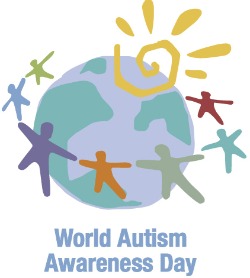It wasn't long ago that the only person most of us knew with autism was Dustin Hoffman's character in Rainman. Now, almost everyone has a friend or family member with a child with an Autism Spectrum Disorder (ASD). The current statistics say that approximately 1 in 110 children in the U.S. are affected by some type of ASD. This can range from Pervasive Developmental Disorder (PDD) to severe autism. This number is up 13% from the mid-90's. We're not sure what has caused the increase. From my reading, it seems to be a combination of things.
- Professionals such as teachers and pediatricians have become more familiar with the signs of the milder forms of ASD, such as PDD and Asperger's Syndrome, so are more likely to refer parents to neurological specialist for evaluation.
- Asperger's Syndrome was not added to the Diagnostic and Statistical Manual of Mental Disorders published by the American Psychiatric Association until 1994, and was not included in autism statistics. See the first point.
- ASD is genetic, though some argue that it can't be completely genetic because genetics can't change so rapidly in just 20 years. I agree that genetics haven't changed. What has changed is our toxic environment. Our food is loaded with chemicals, our homes are full of toxic chemicals used for cleaning or killing pests, our air and water is becoming more and more contaminated. Our bodies can only tolerate so much. When there is already something making the it hard for the body to work the way it should, bombarding it with toxins is more than many can handle.
- What about vaccines? I may lose some readers here, but I just don't believe that vaccines are directly responsible for autism. HOWEVER, I do think they make things worse for those who were born with ASD. See point 3.
All these years of family members thinking I should be stricter, strangers in the grocery store giving us dirty looks as he spins through the aisle, people implying (and some saying outright) that the reason he acts the way he does is because he's homeschooled. If I had only known. But I didn't, and I'm not the only one. Since I've started my blog about Asperger's and started talking to other parents, I've gotten several emails and facebook messages and talked to a couple of parents in person who have realized after hearing me talk about Asperger's or reading the information I've posted, that their child has Asperger's. And these are all older children, not preschoolers. One is a 15-year-old girl who has gone through the school system without anyone ever saying anything. Either she's a really good actress or none of her teachers have been trained in what to look for. None of these kids have been getting the help they needed because we didn't realize they needed it.
Until we clean up our environment and food supply, the numbers are only going to get higher. So what can you do?
- Eliminate as many toxins and chemicals as you can from your home. This includes cleaning supplies, bug killers, and especially your food. You don't have to do it all at once, or throw away everything you own. Start small, by changing a few things at a time and changing brands when it's time to replace what you have. I recommend this for everyone, whether ASD is an issue or not. These toxins also cause cancer and other health problems.
- ASD is nothing to be ashamed of. Don't be afraid to talk about it. I'm not suggesting you rent a hall and give a community speech; just don't feel that you have to hide it. For one thing, knowing your child has ASD helps others to understand your child and you. It may also help them understand someone else in their life.
- If you're not familiar with ASD, take a few minutes and read some of the pages (or sites) below.
Talk About Curing Autism
CDC ASD Page
Wikipedia Asperger's page
Wikipedia Autism page
National Instititute of Health Autism page
Autism Speaks

